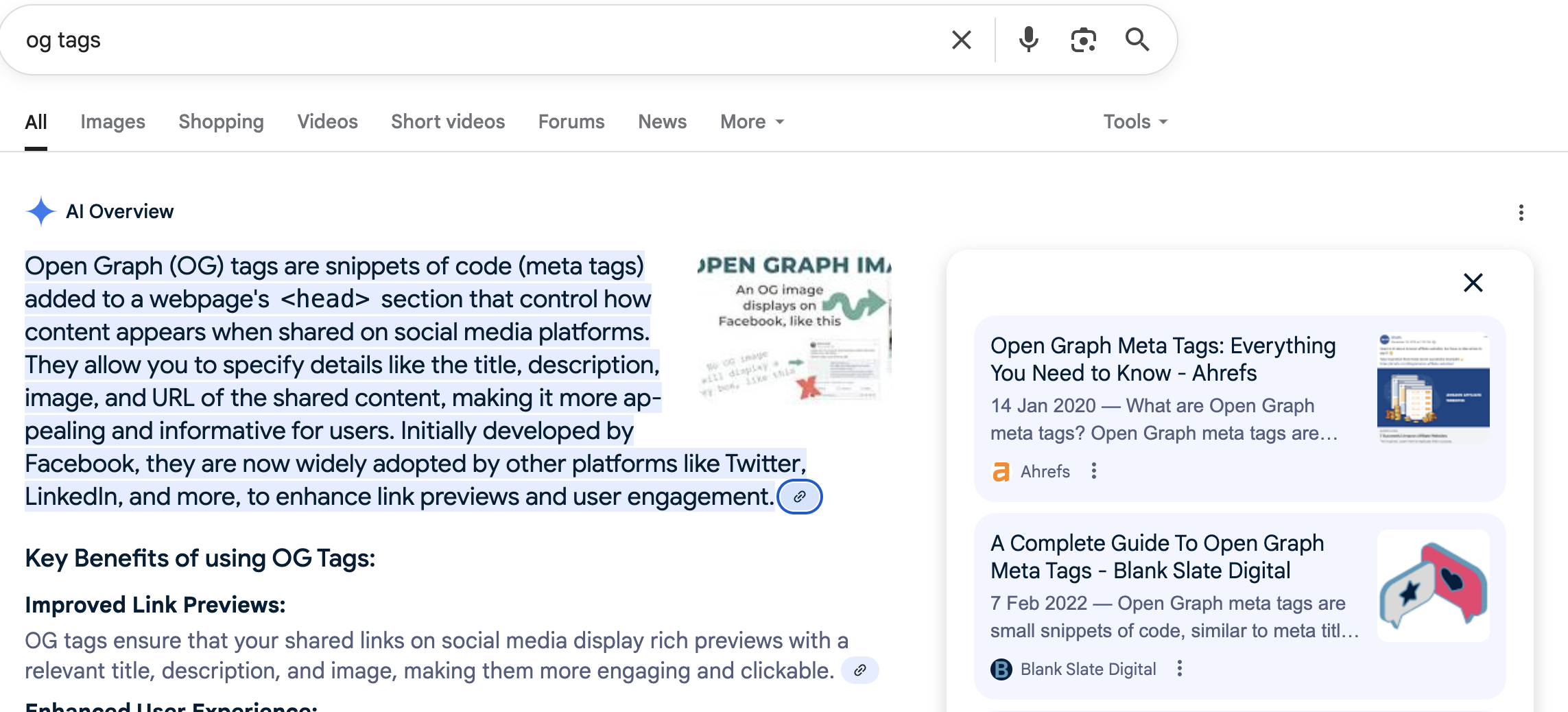Google’s new AI Overviews – powered by its Gemini model and previously known as Search Generative Experience (SGE) – summarise answers at the top of the search results. Early data shows AI Overviews now appear in over half of all searches. To keep (and grow) your organic visibility, you’ll need to double‑down on E‑E‑A‑T, structured data, and concise, experience‑led content that answers complex questions quickly.
What exactly are AI Overviews?
Announced at Google I/O 2024, AI Overviews use generative AI to provide conversational snapshots that answer a query in one hit, complete with cited links for deeper reading. The feature relies on a retrieval‑augmented generation (RAG) approach – it pulls fresh information from authoritative pages in real time and then generates a concise summary.
Why it matters:
- AI Overviews already reach 1.5 billion monthly users globally and drive engagement rates comparable to traditional search ads. (investors.com)
- As of early 2025 they surface in 52 % of queries, with especially rapid growth in travel, food and entertainment searches. (singlegrain.com)
- Google says users who see an Overview actually click more often, discovering a broader range of sources. (developers.google.com)
The net takeaway? Visibility at the top of the AI Overview panel is becoming the new first‑page real estate.

How AI Overviews choose their sources (E‑E‑A‑T)
While Google maintains there is no single ranking factor for AI Overviews, early research and Google’s own documentation suggest the following hierarchy of signals (psst. its the same thing SEO has always been)…
| Signal | Why it matters | Quick win |
|---|---|---|
| Experience & Expertise | Google’s systems look for first‑hand insights, data, and real‑world examples that demonstrate you do the thing you write about. | Add practitioner quotes, case studies, testimonials or data examples. |
| Authoritativeness | High‑authority domains and pages already ranking in the top 10 organic results are far more likely to be cited. | Secure relevant backlinks; refresh older high‑ranking posts. |
| Trustworthiness | Clear sourcing, fact‑checks, and accurate statements reduce hallucination risk. | Cite reputable third‑party studies and link to primary data. |
| Structured data | Schema helps the RAG system retrieve the right context quickly. | Implement Article, FAQPage, and Speakable schema on key pieces. |
Seven optimisation tactics to win visibility
Optimising for AI overviews employs all the same tactics that traditional SEO covers. However, some standout tasks you prioritise are:
1. Answer complex, multi‑step queries in one place
- Break down ‘how’, ‘why’, and ‘what next’ angles within a single article.
- Use sub‑headings and bullet points so Gemini can lift digestible snippets.
2. Surface real‑world expertise
- Embed quotes from your consultants, link to campaign PDFs, and include failure stories as well as successes to build experience signals.
3. Refresh and consolidate legacy content
- Merge thin posts on similar topics into comprehensive guides; redirect old URLs.
4. Deploy FAQ and How‑To schema
- Mark up common follow‑up questions – AI Overviews sometimes surface these verbatim.
5. Optimise for ‘AIO keywords’
- Track terms that already trigger Overviews (e.g., “how to automate metadata with AI”).
- Prioritise ranking in the traditional top ten; visibility there correlates strongly with being cited within the AI Overview.

6. Use rich media
- Images, short‑form video and diagrams are frequently pulled into Overviews.
- Compress media properly to avoid Web‑Vitals penalties.
7. Publish trustworthy author bios
- Include credentials, speaking engagements, and LinkedIn profiles.
- Link to authoritative external coverage where your team is quoted.
Measuring success in an AI‑first SERP
- Separate brand and non‑brand traffic in Search Console. Look for click‑through changes on keywords that now show AI Overviews.
- Track ‘Impressions’ even when clicks drop. An Overview citation still builds brand visibility higher up the funnel.
- Use 3rd‑party AIO trackers to monitor which pages appear in snapshots (tools such as Ahrefs or early‑beta APIs).
- Watch engagement metrics on your long‑form guides – dwell time often increases because visitors land further down the research journey.
What’s next? Preparing for the future of search
- Multimodal queries: Google is experimenting with image‑to‑answer and voice‑to‑answer routines within AI Mode. Expect schema for video chapters and image descriptions to grow in importance.
- Paid AI Overviews? Rumours persist about subscription‑based premium AI results. Keeping organic prominence will likely hinge on deeper E‑E‑A‑T signals and unique first‑party data.
- Generative Engine Optimisation (GEO): Think beyond keywords – optimise your knowledge graphs, data sets and entity relationships.
Final thought
AI Overviews don’t spell the end of organic search, but they raise the bar. Brands that publish helpful, verifiable, experience‑rich content stand to gain. Start by auditing your highest‑commerce queries, layering in schema, and showcasing practitioner insight. If you’d like a hand reviewing your content strategy, get in touch – our specialists are already road‑testing AIO optimisation for clients across the UK.


